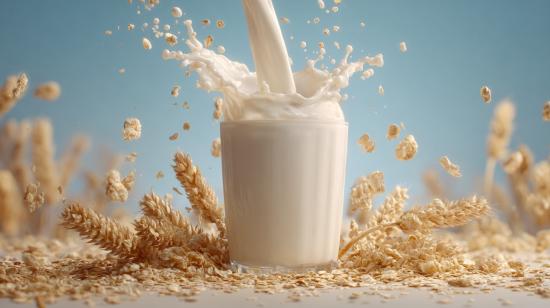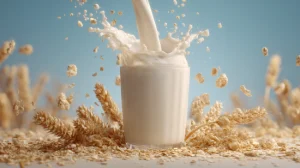
bettergoods Plant-Based Extra Creamy Oat milk, 59 fl oz
- bettergoods Plant-Based Extra Creamy Oat milk, 59 fl oz
- Smooth and delicious with a subtle sweetness
- Perfect for savoring your morning coffee, enjoying a relaxing afternoon tea, or whipping up a culinary masterpiece
- Rich in calcium
- A good source of vitamins D and A
- Plant-based extra creamy recipe
- 7 servings per container
- GLUTEN FREE
$3.83
From Curious Consumer to Oat Milk Connoisseur: My Journey with Bettergoods
Let me tell you something—I never thought I’d be writing a comprehensive guide about oat milk. Yet here I am, several years into my dairy-free journey, ready to share everything I’ve learned about what has become my absolute favorite plant-based milk: Bettergoods Oat Milk.
The first time I tried Bettergoods, it was a complete accident. My regular brand was out of stock, and there sat this sleek, minimalist carton on the shelf, practically begging me to give it a chance. One sip of my morning coffee later, and I was converted. Finding the perfect oat milk can transform your daily routine from ordinary to extraordinary, and Bettergoods did exactly that for me.
Whether you’re a plant-based veteran, newly lactose intolerant, or just oat-milk curious, I’ve compiled everything you need to know about Bettergoods Oat Milk—from what makes it special to where to find the best deals. Let’s dive in!
What Exactly Is Bettergoods Oat Milk?
Bettergoods Oat Milk is a plant-based milk alternative made primarily from—you guessed it—oats! But it’s not just any oat milk. The company prides itself on a proprietary process that creates an exceptionally creamy texture without the need for excessive additives or stabilizers.
The story behind Bettergoods is actually quite interesting. Founded in 2018 by two friends who were frustrated with the chalky texture and odd aftertaste of many plant-based milks, they set out to create something better (hence the name). After countless kitchen experiments and consultations with food scientists, Bettergoods was born.
What sets it apart from competitors is its surprisingly simple approach. While many oat milk brands rely on a complex manufacturing process involving enzymes that break down oat starch into sugars, Bettergoods uses a mechanical process that maintains more of the oats’ natural properties. The result? A clean-tasting oat milk that behaves remarkably like dairy milk without artificial flavors or chemical aftertastes.
The Ingredients Breakdown: What’s Actually in That Carton?
I’m one of those people who meticulously reads ingredient lists, so naturally, I had to know exactly what was in my new favorite beverage. Here’s what you’ll find in Bettergoods Original Oat Milk:
- Filtered water
- Organic oats
- Sunflower oil (for creaminess)
- Sea salt
- Calcium carbonate (for calcium fortification)
- Dipotassium phosphate (a stabilizer)
- Vitamin D2 and B12 (fortification)
That’s it. No carrageenan, no artificial flavors, no gums. Their commitment to simplicity is refreshing in a market where ingredient lists often read like chemistry experiments.
For those wondering about allergens, it’s important to note that while oats themselves are naturally gluten-free, cross-contamination can occur during processing. Bettergoods addresses this by offering both regular and certified gluten-free versions (more on this later).
Is Bettergoods Organic and Non-GMO?
This is one of the first questions I had when I discovered the brand. The answer is yes—partially. Bettergoods uses organic oats in all their products, but not all additional ingredients carry organic certification. However, every Bettergoods product is Non-GMO Project Verified, which was a significant factor in my decision to make it my go-to brand.
Their commitment to responsible sourcing extends beyond certifications. The company maintains direct relationships with oat farmers across North America, primarily in the Midwest and parts of Canada. These partnerships allow for better quality control and support sustainable farming practices.
For the environmentally conscious consumer (which, let’s be honest, should be all of us these days), it’s worth mentioning that Bettergoods also participates in a carbon offset program. They calculate the carbon footprint of their production and distribution chain and invest in environmental projects to neutralize their impact.
The Sweet Truth: Sugar Content and Flavored Options
One of my personal pet peeves with many plant-based milks is the hidden sugars. I switched to plant milk for health reasons, so discovering that some brands pack in more sugar than a candy bar was disappointing, to say the least.
Here’s where Bettergoods really shines. Their Original Oat Milk contains no added sugars whatsoever. There is some natural sugar from the oats themselves (about 7g per cup), but nothing extra is added. For comparison, some competing brands contain up to 19g of sugar per cup—that’s nearly 5 teaspoons!
If you do have a sweet tooth, Bettergoods offers several flavored options:
- Vanilla Bean: Made with real vanilla bean paste, not artificial flavoring
- Chocolate: Using fair-trade cocoa
- Maple: A seasonal offering featuring organic maple syrup
- Barista Blend: Slightly sweetened for optimal coffee performance
Each flavored variety does contain some added sugar (usually between 4-9g per cup), but they use organic cane sugar or maple syrup rather than high-fructose corn syrup or artificial sweeteners.
I personally alternate between the Original for everyday use and the Barista Blend for my weekend coffee ritual. The Vanilla Bean also makes exceptional French toast, just saying.
Nutritional Breakdown: How Does It Stack Up?
Let’s talk nutrition. After all, many of us turn to alternative milks for health benefits. Here’s what you’re getting in one cup (8oz) of Bettergoods Original Oat Milk:
- Calories: 120
- Fat: 5g (0.5g saturated)
- Carbohydrates: 16g
- Fiber: 2g
- Sugars: 7g (0g added)
- Protein: 3g
- Calcium: 350mg (35% DV)
- Vitamin D: 3.6mcg (18% DV)
- Vitamin B12: 1.2mcg (50% DV)
- Vitamin A: 150mcg (15% DV)
Compared to cow’s milk, Bettergoods has slightly more calories and carbohydrates but less protein. The fat content is comparable to 2% dairy milk. Where it really shines is in the fiber content—something dairy milk doesn’t provide at all.
The fortification profile is impressive too. Bettergoods deliberately formulated their oat milk to match or exceed dairy milk’s calcium content, addressing one of the main nutritional concerns people have when switching away from dairy.
For those watching specific nutrients, it’s worth noting that Bettergoods also offers a “Protein+” version with 8g of protein per serving (achieved by adding pea protein), and a “Light” version with only 90 calories per cup.
The Gluten Question: Is Bettergoods Gluten-Free?
This is where things get a bit complicated. Oats themselves don’t naturally contain gluten, but they’re often processed in facilities that also handle wheat, barley, and rye. Cross-contamination is common enough that many people with celiac disease or severe gluten sensitivities avoid regular oats altogether.
Bettergoods addresses this concern with two distinct product lines:
- Standard Bettergoods Oat Milk: Made with regular oats that may contain traces of gluten (less than 20ppm, which is still considered “gluten-free” by FDA standards, but may not be suitable for those with severe sensitivities)
- Bettergoods Certified GF Oat Milk: Made with certified gluten-free oats processed in dedicated gluten-free facilities and tested to contain less than 10ppm of gluten
The certified gluten-free version comes in a slightly different package—look for the prominent “Certified GF” logo on the front and the slightly darker colored carton. It typically costs about $0.50 more per container, reflecting the additional costs of certified gluten-free ingredients and dedicated processing.
As someone with mild gluten sensitivity, I find the standard version works fine for me, but I appreciate that they offer the certified option for those who need it.
Vegan-Friendly: Plant-Based From Start to Finish
For the vegans out there (or those trying to reduce animal product consumption), I’m happy to report that Bettergoods Oat Milk is 100% vegan-friendly. Every ingredient is plant-derived, including the Vitamin D, which is D2 (ergocalciferol) sourced from fungi rather than D3 (which is often derived from lanolin in sheep’s wool).
The company’s commitment to vegan values extends beyond the product itself. Bettergoods is certified cruelty-free, meaning no animal testing is conducted at any stage of product development. Their packaging is also free from animal-derived components, using plant-based adhesives rather than casein-based ones that some manufacturers still use.
Even the production facility maintains vegan standards, with no animal products processed on the same lines. This level of commitment makes Bettergoods a standout choice for ethical vegans concerned about cross-contamination or companies with mixed ethical practices.
Coffee Shop at Home: Using Bettergoods in Beverages
Let’s talk about what made me fall in love with Bettergoods in the first place—its performance in coffee. As a former barista (a brief but educational career detour in my twenties), I’m particularly picky about how my plant milk behaves in hot beverages.
Many oat milks either separate (that unappetizing curdled look), fail to froth properly, or impart an overwhelming oat flavor that competes with the coffee. Bettergoods does none of these things.
The regular Bettergoods froths surprisingly well for a non-barista-specific formula, creating a microfoam that lasts. It has a neutral-yet-complementary flavor that enhances coffee rather than masking it, with just enough natural sweetness to take the edge off darker roasts.
Their dedicated Barista Blend, however, is on another level entirely. It creates a silky microfoam that holds latte art almost as well as dairy milk does. The slightly higher fat content (7g per cup versus 5g in the original) contributes to this performance, along with a small amount of added sugar that helps with caramelization when steaming.
For tea drinkers, the Original unsweetened version is ideal—it doesn’t overpower delicate flavors but adds a pleasant, subtle creaminess. I find it particularly lovely with Earl Grey or chai.
Where to Find Bettergoods: The Hunt for the Perfect Carton
When I first discovered Bettergoods, finding it consistently was a bit of a challenge. Three years later, its availability has improved dramatically, but it’s still not as ubiquitous as some other brands. Here’s where you can reliably find it:
Major Grocery Chains
- Whole Foods Market (nationwide)
- Sprouts Farmers Market
- Natural Grocers
- Wegmans (East Coast)
- Target (select locations, primarily in urban areas)
- Kroger and Kroger-owned stores (including Fred Meyer, Ralph’s, etc.)
Online Options
- Amazon Fresh
- Thrive Market
- Instacart (depending on your local stores)
- Direct from Bettergoods.com (minimum purchase of 6 cartons)
Specialty and Local
- Most independent natural food stores
- Many food co-ops
- Some coffee shops now sell retail cartons alongside using it for beverages
From my experience, Whole Foods typically has the most reliable stock and frequently runs promotions. If you’re having trouble finding it, the store locator on the Bettergoods website is quite accurate and includes a filter for which specific varieties each location carries.
Price Point: Is Bettergoods Worth the Investment?
Let’s address the elephant in the room—Bettergoods isn’t the cheapest oat milk on the market. A 32oz carton typically retails between $4.99-$5.99, depending on the variety and location. The specialized versions (Protein+, Barista, or Certified GF) usually command an additional $0.50-$1.00 premium.
For comparison:
- Store brand oat milk: $2.99-$3.99
- Oatly: $4.49-$5.49
- Chobani Oat: $3.99-$4.99
- Pacific Foods Oat: $3.99-$4.79
Is the price difference justified? After trying numerous brands, I genuinely believe it is. The superior texture, clean ingredient list, and reliable performance in coffee make it worth the extra dollar or so per carton for me. That said, I do stock up when it goes on sale, which happens with reasonable frequency at Whole Foods (typically $3.99 during promotions).
To maximize value, I recommend:
- Signing up for the Bettergoods newsletter for coupons (they send a $1 off coupon to new subscribers)
- Watching for sales at Whole Foods, which often coincide with Amazon Prime member promotions
- Buying the shelf-stable version in bulk when on sale (it lasts up to 9 months unopened)
- Checking if your health insurance offers wellness rewards that can be used at health food stores
For those who use oat milk daily, the subscription option on their website offers a 15% discount and free shipping on orders of 6+ cartons, bringing the per-unit cost down significantly.
Packaging Matters: Refrigerated vs. Shelf-Stable
Bettergoods comes in two primary packaging formats, each with pros and cons:
Refrigerated (Fresh)
- Found in refrigerated sections
- 32oz carton with screw cap
- Lasts about 7-10 days after opening
- Typically has a 30-45 day shelf life before opening
- Slightly creamier texture according to some tasters (including me)
Shelf-Stable
- Found in non-refrigerated aisles
- 32oz aseptic carton with pull-tab opening
- Lasts 7-10 days after opening (must be refrigerated once opened)
- Shelf life of 9 months unopened
- Identical ingredient list to refrigerated version
- Slightly less creamy in side-by-side comparisons, but the difference is minimal
I typically keep both on hand—refrigerated for daily use and a few shelf-stable cartons in the pantry as backup. The shelf-stable version is also great for travel; I’ve brought it on road trips and to rental properties where good plant milk options might be limited.
An important note: While the shelf-stable version doesn’t need refrigeration before opening, it does need to be chilled for at least a few hours before using in coffee. Room-temperature oat milk tends to separate more readily when hitting hot liquid.
Storage Tips: Making Your Bettergoods Last
Once opened, Bettergoods recommends consuming their oat milk within 7-10 days. In my experience, it often stays good for up to 14 days if stored properly, but quality does begin to decline after the first week.
To maximize freshness:
- Always store in the refrigerator (even the shelf-stable version once opened)
- Keep the carton as far from the refrigerator door as possible (temperature is more stable in the back)
- Make sure the cap is tightly secured after each use
- Avoid drinking directly from the carton (introduces bacteria)
- Check for signs of spoilage before using: unusual smell, thickened texture, or separation that doesn’t disappear with shaking
Unlike dairy milk, which typically sours with an unmistakable odor, oat milk tends to develop a slightly yeasty or fermented smell when beginning to spoil. If you notice this, or if the texture seems unusually thick or slimy, it’s time to discard it.
Allergy Information: Beyond Just Gluten
For those with food allergies, Bettergoods is a relatively safe option. It’s free from:
- Dairy
- Nuts (tree nuts and peanuts)
- Soy
- Eggs
- Fish/shellfish
As mentioned earlier, the standard version may contain traces of gluten, while the Certified GF version is safe for those with celiac disease or severe gluten sensitivities.
One less obvious allergen to be aware of: the Sunflower oil used in Bettergoods could be problematic for those with rare sunflower seed allergies. They do not currently offer a sunflower-free version, though their FAQ indicates they’re exploring alternative oils for future formulations.
All Bettergoods products are produced in a dedicated facility that does not process the top 8 allergens, which is reassuring for those with severe allergies concerned about cross-contamination.
How Does Bettergoods Compare to Competitors?
I’ve tried virtually every oat milk on the market at this point, so let me break down how Bettergoods compares to other popular brands:
Bettergoods vs. Oatly
Oatly was my go-to before discovering Bettergoods. The primary differences:
- Oatly has a more pronounced oat flavor
- Bettergoods has a cleaner ingredient list (no oils, phosphates)
- Bettergoods performs better in coffee without specialized barista formulations
- Oatly is more widely available internationally
- Bettergoods typically costs $0.50 more per carton
Bettergoods vs. Chobani Oat
- Chobani is slightly sweeter, even in the “plain” version
- Bettergoods has a creamier texture
- Chobani is more readily available in mainstream grocery stores
- Bettergoods has higher quality ingredients and better environmental practices
- Chobani is typically $1 less expensive
Bettergoods vs. Califia Farms Oat
- Califia has a thinner consistency
- Bettergoods performs better in hot beverages
- Califia offers more flavored options
- Bettergoods has better nutritional fortification
- Similar price points
Bettergoods vs. Store Brands
- Store brands typically have more additives and stabilizers
- Bettergoods has significantly better texture and flavor
- Store brands are $1-2 cheaper per carton
- Bettergoods has better ethical and environmental practices
- Store brands are more inconsistent in quality batch-to-batch
In my kitchen, Bettergoods has earned its place as the premium option worth paying for, but I occasionally use Chobani when I’m making large batches of oat milk-heavy recipes like soups or sauces where the subtle quality differences are less noticeable.
Real Customer Experiences: Beyond My Personal Opinion
While I’m clearly a fan, I wanted to provide a more balanced view by gathering opinions from friends, family, and online reviews. Here’s what the consensus seems to be:
What People Love
- The creamy texture that doesn’t feel watery or chalky
- Performance in coffee, especially lack of separation
- Clean ingredient list without gums or excessive additives
- Neutral flavor that doesn’t overwhelm other ingredients
- Eco-friendly packaging and company practices
Common Complaints
- Price point is higher than many competitors
- Limited availability in some regions
- Occasional consistency issues between batches
- Some find the Original version not sweet enough (particularly those transitioning from dairy)
- The chocolate flavor is less sweet than many expect
On major review platforms, Bettergoods consistently earns 4.5-4.8 out of 5 stars, with texture and performance in coffee being the most frequently praised aspects. The primary criticism almost always relates to price rather than quality.
Scoring Special Deals: Maximizing Your Bettergoods Budget
If you’re convinced to try Bettergoods but concerned about the price, I’ve become something of an expert at finding deals over the years. Here are my top strategies:
Regular Promotions
- Whole Foods runs “Prime Member Deals” on Bettergoods approximately every 6-8 weeks, typically offering $2 off
- Natural Grocers features it in their monthly coupon books about once per quarter
- Target Circle frequently offers 20% off promotions on plant-based milks, including Bettergoods
Seasonal Deals
- “Veganuary” (January) almost always brings plant milk promotions
- Back-to-school season (August/September) often features breakfast-related sales
- Earth Month (April) typically includes deals on eco-friendly brands like Bettergoods
Loyalty Programs
- The Bettergoods subscription service (15% off + free shipping on 6+ cartons)
- Their referral program gives both parties $5 off when you refer a friend
- Joining their email list gets you a $1 off coupon immediately and birthday coupons annually
Bulk Purchasing
- The shelf-stable version can be bought in bulk during sales without concern about expiration
- Some natural food stores offer case discounts (typically 10% off when buying 12+ cartons)
- Costco has periodically carried Bettergoods in 3-packs at significant savings
My personal strategy is to stock up during Whole Foods Prime deals, buying 6-8 cartons of the shelf-stable version, while maintaining my subscription for two cartons of refrigerated original monthly.
Making the Most of Your Bettergoods: Recipe Ideas
While drinking it straight or using it in coffee are the obvious applications, Bettergoods really shines in cooking and baking. Here are some of my favorite ways to use it:
Breakfast Applications
- Overnight oats (meta, I know—oats soaked in oat milk!)
- French toast batter (the Vanilla Bean version makes this exceptional)
- Pancake or waffle batter substitute for dairy milk 1:1
- Smoothie base (adds creaminess without dairy)
Savory Cooking
- Creamy soups (particularly potato leek or mushroom)
- Mashed potatoes (the Original adds richness without competing flavors)
- Pasta sauces (makes an excellent substitute for cream in lighter alfredo)
- Savory oatmeal risotto (double the oat goodness)
Baking
- Cakes and quick breads (1:1 substitute for dairy milk)
- Cookies (works particularly well in oatmeal cookies—again, meta!)
- Homemade bread (adds a subtle sweetness to the dough)
- Custards and puddings (the Barista blend works best due to higher fat content)
Desserts
- Homemade ice cream base (mix with coconut cream for best results)
- Popsicles (the Chocolate version makes incredible fudgesicles)
- Mousse (use the Barista blend for best results)
- Tres leches cake (part of a plant-based milk combination)
The versatility of Bettergoods is truly impressive—its neutral flavor profile and reliable performance in heating make it my go-to for virtually any recipe calling for dairy milk.
The Final Verdict: Is Bettergoods Worth It?
After three years of regular use and experimenting with virtually every oat milk on the market, my verdict is an emphatic yes. Bettergoods Oat Milk offers the best combination of taste, texture, performance, and ingredients of any plant milk I’ve tried.
Is it perfect? No. The price point is higher than I’d like, and availability can still be spotty in some areas. But for a product I use daily—something that affects the taste of my morning coffee and the success of my recipes—the quality justification is there.
For those new to oat milk or considering switching brands, I’d recommend starting with the Original refrigerated version. If you find yourself converted like I was, then explore their other varieties to find your perfect match.
At the end of the day, the food and drinks we consume are some of the most personal choices we make. They affect our health, our enjoyment, and increasingly, our environmental impact. For me, Bettergoods hits the sweet spot where all three of these considerations meet, making that slightly higher price tag worth every penny.
Whether you’re plant-based for ethical reasons, managing allergies or intolerances, or simply curious about alternatives to dairy, I hope this comprehensive guide helps you navigate the increasingly crowded world of oat milk with confidence. Here’s to finding your perfect pour!







